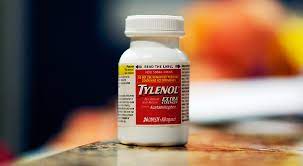As a gluten-sensitive person, it can be challenging to determine which medications are gluten-free and safe to take. One common medication that many people use is Tylenol, but is it gluten-free? In this article, we will explore the topic of Tylenol and gluten and provide you with a comprehensive guide to understanding Tylenol ingredients.
What is Tylenol?
Tylenol is a brand name for acetaminophen, which is an over-the-counter (OTC) pain reliever and fever reducer. Tylenol is manufactured by Johnson & Johnson and has been on the market since the 1950s. It is widely used for the treatment of mild to moderate pain, including headaches, menstrual cramps, toothaches, and muscle aches.
Is Tylenol Gluten-Free?
The simple answer is yes; Tylenol is gluten-free. According to the manufacturer, all Tylenol products are gluten-free. Johnson & Johnson follows strict guidelines to ensure that all Tylenol products are free of gluten.
Tylenol Ingredients
To understand why Tylenol is gluten-free, it is essential to know the ingredients of the medication. Tylenol contains both active and inactive ingredients.
Active Ingredients
The active ingredient in Tylenol is acetaminophen. Acetaminophen is a pain reliever and fever reducer that works by blocking the production of prostaglandins, which are responsible for causing pain and inflammation in the body.
Inactive Ingredients
The inactive ingredients in Tylenol can vary depending on the specific product. However, most Tylenol products contain the following inactive ingredients:
- Cornstarch
- Hypromellose
- Magnesium stearate
- Povidone
- Sodium starch glycolate
- Stearic acid
None of these ingredients contain gluten, making Tylenol a safe option for those who are sensitive to gluten.
Gluten-Free Certification
Although Tylenol is gluten-free, it is essential to note that it does not have gluten-free certification. Gluten-free certification is a process that ensures that a product meets the FDA’s gluten-free standard of less than 20 parts per million (ppm) of gluten. While Tylenol does not have this certification, it is still considered gluten-free.
How to Check if Tylenol is Gluten-Free
If you are unsure whether a medication is gluten-free, the best way to find out is by checking the ingredient list. All medications are required to have a list of ingredients on the packaging. Look for any ingredients that contain wheat, barley, or rye. If there are no gluten-containing ingredients, the medication is safe to take.
Other Gluten-Free Pain Relief Options
If you are unable to take Tylenol or prefer an alternative pain relief option, there are other gluten-free options available. Some common gluten-free pain relievers include:
- Advil (Ibuprofen)
- Aleve (Naproxen)
- Aspirin
- Motrin (Ibuprofen)
- Naprosyn (Naproxen)
- Bayer (Aspirin)
Always be sure to check the ingredient list before taking any medication to ensure that it is gluten-free.
Conclusion
In conclusion, Tylenol is a gluten-free pain relief option that is safe for those who are sensitive to gluten. Tylenol contains active and inactive ingredients that do not contain gluten, and Johnson & Johnson follows strict guidelines to ensure that all Tylenol products are free of gluten. However, it is important to note that Tylenol does not have gluten-free certification, so it is always a good idea to check the ingredient list before taking any medication.
FAQs
- Can I take Tylenol if I have celiac disease?
Yes, you can take Tylenol if you have celiac disease. Tylenol is gluten-free and safe for those who are sensitive to gluten. - Are all Tylenol products gluten-free?
Yes, all Tylenol products are gluten-free according to the manufacturer, Johnson & Johnson. - Does Tylenol have gluten-free certification?
No, Tylenol does not have gluten-free certification. However, it is still considered gluten-free. - Are there any gluten-containing ingredients in Tylenol?
No, there are no gluten-containing ingredients in Tylenol. - What other pain relief options are gluten-free?
Some common gluten-free pain relief options include Advil, Aleve, Aspirin, Motrin, Naprosyn, and Bayer.
Read : Free Dental Consultation

